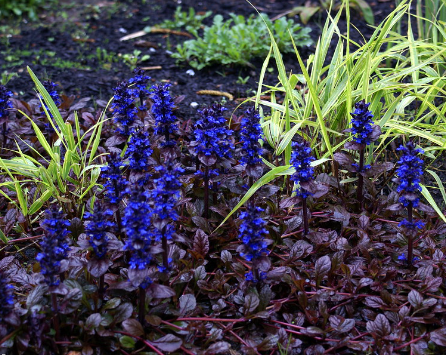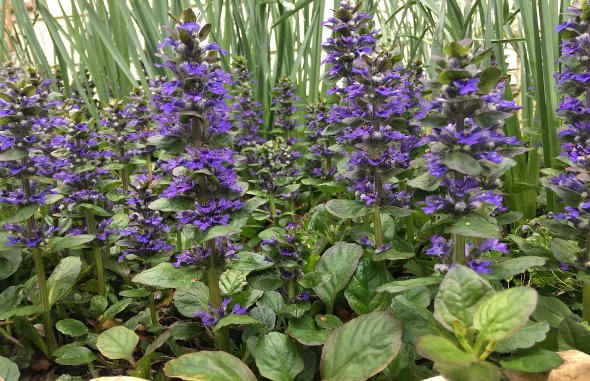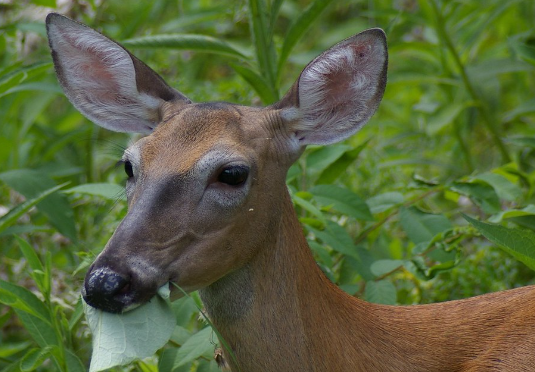Deer can eat ajuga, also known as bugleweed, but they rarely do. This ground cover plant has bitter-tasting leaves and spiky flowers, making it an unattractive option for deer.
Usually, deer only nibble on ajuga when other food sources are scarce.

Although ajuga is considered deer-resistant, no plant is completely safe from a hungry deer. If your garden has a high deer population, you might still notice some damage.
By planting ajuga alongside other deer-resistant plants, you can further protect your garden.
For those interested in maintaining a beautiful garden while keeping deer at bay, understanding which plants are less appealing to wildlife is key.
Ajuga offers a reliable option with its vibrant blooms and hardiness, making it a popular choice for many gardeners.
Do Deer Eat Ajuga Bugleweed?

Ajuga, also called bugleweed, is a versatile ground cover. While it has beautiful blue and violet flowers that add charm to gardens, you might be wondering if deer find it tasty.
Deer are selective feeders, so they usually go for their preferred food sources first. Ajuga has bitter-tasting leaves and spiky flowers, making it less appealing to deer.
This plant is generally considered deer-resistant.
When food is scarce, deer can eat almost anything, including ajuga. If you notice damage to your plants, it’s likely because other food options are unavailable.
Health-wise, ajuga isn’t harmful to deer, but its bitter taste discourages frequent munching.
Mixing ajuga with other deer-resistant plants like alliums can help further protect your garden.
Key Points:
Bitter Taste: Ajuga has bitter leaves and spiky flowers that deer don’t prefer.
Deer-Resistant: Not completely immune but less likely to be eaten by deer.
Damage: Occurs mostly when other food sources are scarce.
Health Impact: Safe for deer, just not appealing.
By understanding these points, you can better protect your garden and keep your ajuga healthy and beautiful.
Are Ajuga Bugleweed Deer Resistant?
Ajuga bugleweed is known for its attractive ground cover. You may wonder if deer are a threat to this plant.
Ajuga, also called bugleweed, has bitter leaves and spiky flowers. Deer generally avoid these types of plants. This is one reason ajuga is considered deer-resistant.
Although deer might nibble on ajuga, it’s not their first choice. They prefer more palatable plants. Ajuga’s bitterness helps keep deer away.
Ajuga can thrive in gardens with a lot of deer activity.
Here are some benefits of ajuga bugleweed:
- Deer-resistant
- Ground cover
- Beautiful flowers
Despite its resistance, ajuga is not toxic to deer. They will eat it in rare situations when food is scarce. Plan your garden with this in mind.
Combining ajuga with other deer-resistant plants can further protect your garden.
Other deer-resistant plants include:
- Alliums
- Lavender
- Yarrow
Ajuga bugleweed is also great for erosion control and stabilizing slopes. When you plant ajuga, space the plants about one foot apart for good air circulation.
How To Keep Deer From Eating Ajuga Bugleweed

To keep deer from eating your ajuga bugleweed, it’s important to use a combination of strategies.
First, consider planting deer-resistant plants around your ajuga.
Plants like marigolds, salvia, daffodils, chives, rosemary, oregano, and spearmint can help deter deer from your garden.
Another effective way to protect your ajuga is by using deer repellent sprays.
These sprays often have a strong odor or taste that deer dislike. Regularly applying these to your plants can keep deer at bay.
Fencing is another great option. A tall fence, at least 8 feet high, can prevent deer from entering your garden.
If a tall fence isn’t feasible, consider using a double-layered shorter fence.
For added protection, try using allium or boxwood as a natural barrier.
These plants have scents that deer generally avoid. Sweet woodruff can also be planted to deter deer.
Watering your ajuga regularly ensures that the plants remain healthy, and healthy plants are more resilient to damage.
Gardeners can also try hanging soap bars or placing hair clippings around the garden.
Both methods create strong odors that repel deer.
Will Ajuga Bugleweed Grow Back After Being Eaten By Deer?

Ajuga bugleweed can recover after being eaten by deer, depending on how much damage was done and how healthy the plant remains.
Follow these steps to help your ajuga bounce back and grow strong again.
Steps To Help Your Bugleweed Recover From Deer Damage
1. Examine and Prune Damaged Stems
Check your plants for any broken or chewed stems. Use clean, sharp shears to cut off the damaged parts. Pruning helps the plant focus energy on new growth.
2. Water and Fertilize
Water your Ajuga bugleweed regularly, especially during dry periods. This keeps the soil moist but well-draining. Apply a balanced fertilizer in early spring to support its health and growth.
3. Improve Soil and Air Circulation
Ensure your bugleweed is in moist, well-draining soil. Good air circulation can prevent diseases. Space your plants about one foot apart to avoid overcrowding.
4. Winter Protection
If you live in a cold area, provide mulch around the roots. This protects the plant during winter. Mulch keeps the soil temperature steady and reduces erosion.
Understanding Deer’s Diet And Ajuga Bugleweed
Deer have seasonal variations in their diet, which affects their interaction with plants like Ajuga, also known as bugleweed.
Ajuga is a popular ground cover with colorful flowers and leaves, and it is often noted for its resilience and low-maintenance needs.
Seasonal Variations In Deer’s Diet
In spring, deer feed on tender shoots and young leaves, which are high in nutrients.
Ajuga’s vibrant foliage, including varieties like “Burgundy Glow” and “Chocolate Chip,” may be less appealing due to their bitter-tasting leaves.
During summer, deer primarily eat a variety of plants and foliage.
Ajuga’s dense ground cover and spiky blue flowers, especially Ajuga reptans, provide an unattractive option for deer, due to the plant’s taste and texture.
In fall, when food is scarce, deer may target less favored plants.
Ajuga may face some browsing but generally remains less consumed due to its bitterness and tough texture.
Deer typically avoid Ajuga not only because of its taste but also because it thrives in shaded areas and can endure partial to full shade, unlike most of their preferred plants.
What About Other Wildlife And Ajuga Bugleweed?
Ajuga bugleweed is not just resistant to deer; it also has varied interactions with other wildlife.
Despite its bitter taste and spiky flowers, rabbits may occasionally nibble on ajuga. However, it’s not a top choice for them.
When you plant ajuga, you might notice fewer rabbits damaging your garden.
Pets typically avoid ajuga because of its bitterness. However, you should still monitor your pets to ensure they don’t eat any garden plants they shouldn’t.
Hummingbirds are not particularly drawn to ajuga bugleweed. They usually prefer tubular flowers with nectar.
So, if you want to attract hummingbirds, you might consider additional plants like columbines or trumpet vines.
Ajuga bugleweed has some historical uses as a medicinal herb. It contains flavonoids and tannins, which were once used to treat inflammation and diarrhea.
Today, it’s more common as a ground cover rather than medicinal use.
In mixed plantings, ajuga pairs well with shrubs and other groundcovers. Its dense growth helps choke out weeds and provides a lush look to your garden.
Ajuga’s resilience makes it a great choice for areas where other plants might struggle.
While ajuga bugleweed is not specifically known for aiding weight loss, its traditional uses highlight its diverse applications.
Modern gardens use it more for its aesthetic and practical benefits than for health reasons.
